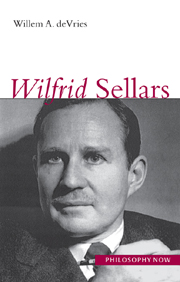Book contents
- Frontmatter
- Contents
- Preface
- Abbreviations
- 1 Sellars's philosophical enterprise
- 2 Sellars's philosophy of language
- 3 Categories, the a priori, and transcendental philosophy
- 4 Sellars's nominalism
- 5 Knowledge and the given
- 6 Science and reality
- 7 Intentionality and the mental
- 8 Sensory consciousness
- 9 Practical reason
- 10 The necessity of the normative
- Notes
- Bibliography
- Index
6 - Science and reality
Induction, laws, theories and the real
- Frontmatter
- Contents
- Preface
- Abbreviations
- 1 Sellars's philosophical enterprise
- 2 Sellars's philosophy of language
- 3 Categories, the a priori, and transcendental philosophy
- 4 Sellars's nominalism
- 5 Knowledge and the given
- 6 Science and reality
- 7 Intentionality and the mental
- 8 Sensory consciousness
- 9 Practical reason
- 10 The necessity of the normative
- Notes
- Bibliography
- Index
Summary
Natural philosophers have hitherto sought to understand ‘meanings’; the task is to change them.
(CDCM: 288)From observation to law to theory
Empiricism assumes we can know some particular facts independently of others; we can collect such evidential facts and make nondeductive inferences to general truths; and, finally, we can develop theories that enable us to explain these general truths. Traditional empiricism also assumes that our knowledge hooks into reality via the given and, thus, that all our general ‘abstract’ knowledge is ultimately in the service of our interaction with the given. Science, the repository of our most general and most abstract knowledge, is treated as merely instrumental. Science develops ever more sophisticated methods to anticipate and plan for encounters with the given, but the given retains ontological priority over any posits science may propose.
Sellars does not accept any of this. His critique of the given and his view of observation knowledge disrupt this vision of a unidirectional march from the particular to the general and from the concrete to the abstract. Science, he believes, is the measure of what is real. This chapter explores how Sellars conceives of general and theoretical knowledge, his reasons for espousing scientific realism, and what he has to say about the nature and justification of induction.
Laws as inference tickets
Generalizations versus lawlike generalizations
A standing problem for empiricism is distinguishing adequately between true contingent empirical generalizations, such as “All the coins in my pocket are pennies” or “All the dinosaurs are dead”, and lawlike empirical generalizations, such as “Whenever there's lightning there's thunder”.
- Type
- Chapter
- Information
- Wilfrid Sellars , pp. 142 - 170Publisher: Acumen PublishingPrint publication year: 2005

